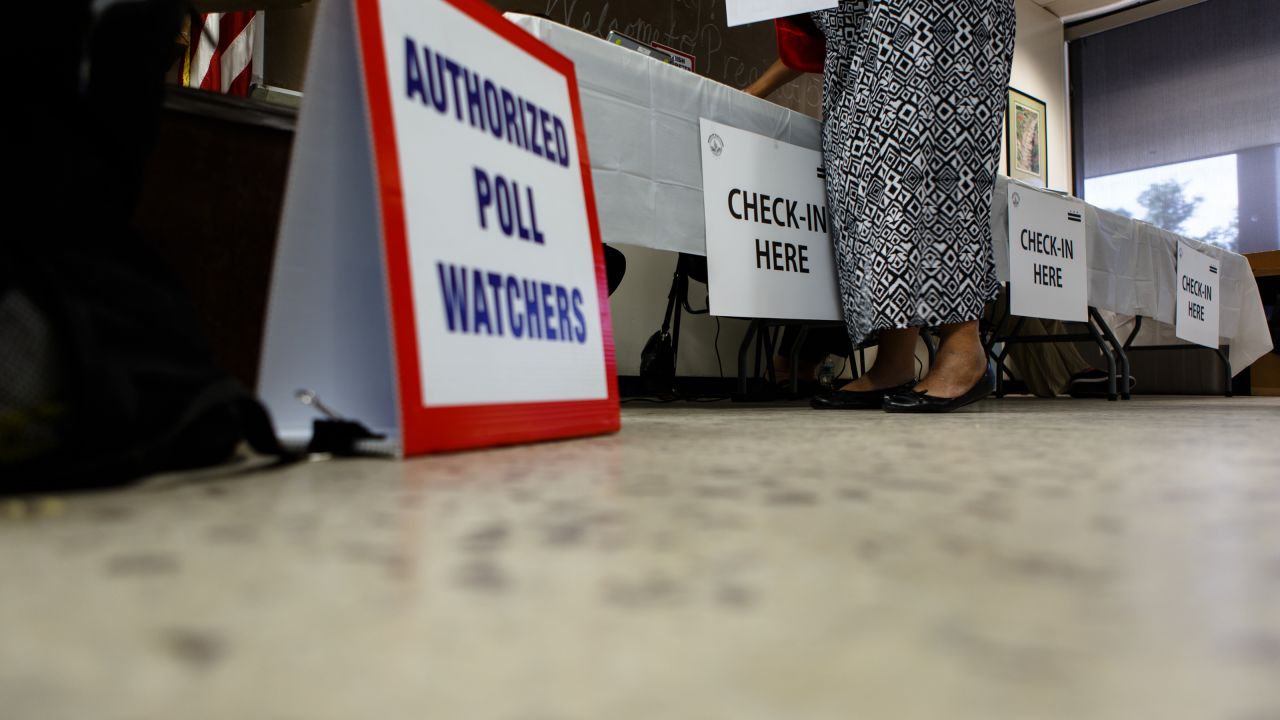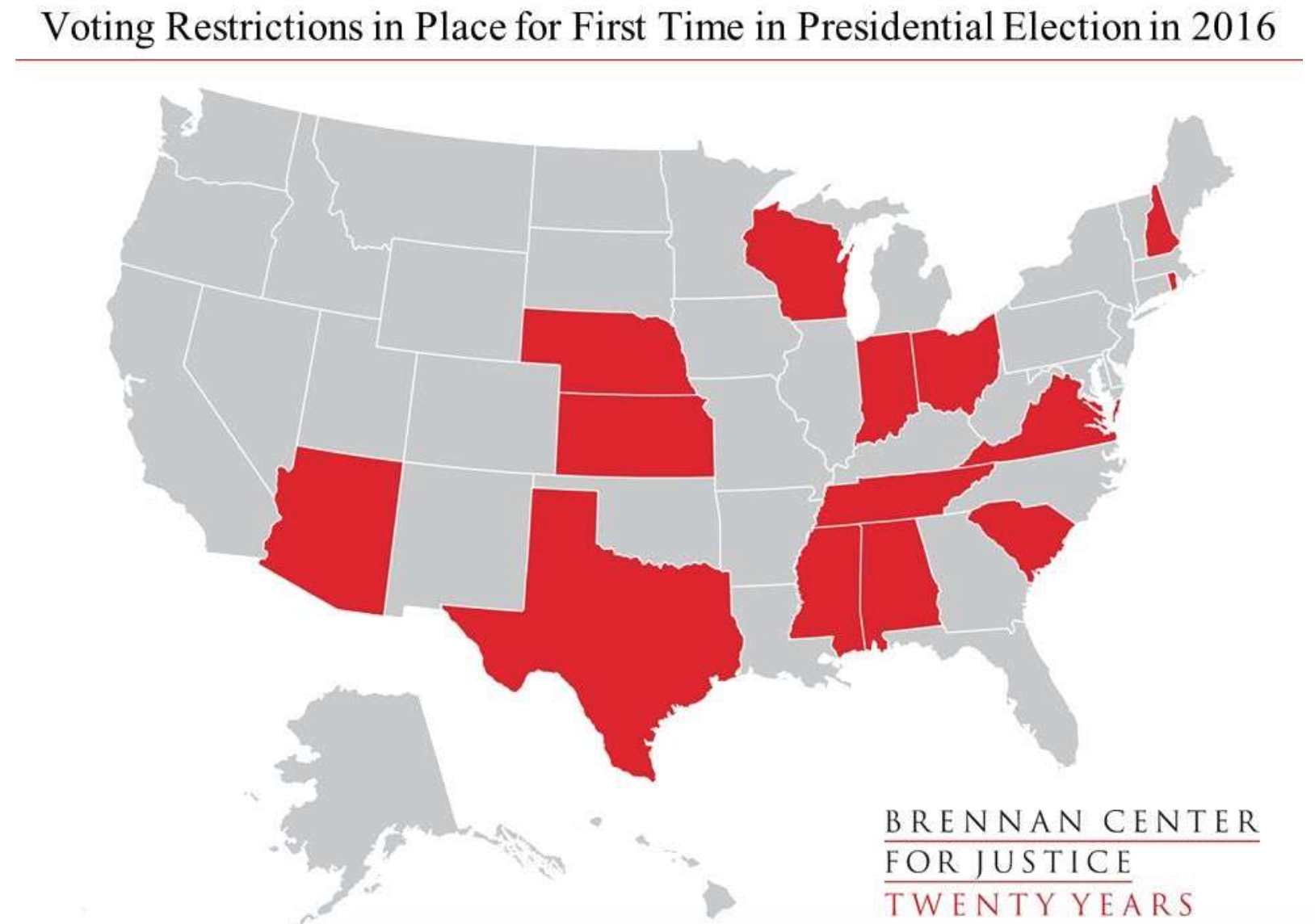
The GOP’s voter-fraud crusade dates back to the 2000 election in Florida. That year, the state wrongly purged thousands of voters from the rolls. Now, poll watchers are stationed at polling places throughout the country, including this one in Washington, DC. (Photo by Keith Lane for The Washington Post via Getty Images)
This post originally appeared at The Nation.
Donald Trump is at it again. After claiming in August that “we may have people vote 10 times,” he’s doubling down on his rigged-election screed. He’s called for his supporters to monitor the polls in “certain areas” and is recruiting “Trump Election Observers” to “Stop Crooked Hillary From Rigging This Election!” Trump tweeted this morning: “Of course there is large-scale voter fraud happening on and before election day. Why do Republican leaders deny what is going on? So naive!”
Trump’s rhetoric is working his supporters into a frenzy. Seventy-three percent of Republicans believe the election could be stolen from him, and Trump’s supporters are explicitly calling for “racial profiling” at the polls, reports The Boston Globe:
“Trump said to watch your precincts. I’m going to go, for sure,” said Steve Webb, a 61-year-old carpenter from Fairfield, Ohio.
“I’ll look for… well, it’s called racial profiling. Mexicans. Syrians. People who can’t speak American,” he said. “I’m going to go right up behind them. I’ll do everything legally. I want to see if they are accountable. I’m not going to do anything illegal. I’m going to make them a little bit nervous.”
Some Republicans have denounced Trump’s rhetoric, but the GOP has been crying wolf about voter fraud for two decades. Trump is pouring gasoline on a fire his own party created.
The GOP’s voter-fraud crusade dates back to the 2000 election in Florida. That year, the state of Florida wrongly purged thousands of voters from the rolls, as I reported in a Nation excerpt from my book Give Us the Ballot:
The NAACP sued Florida after the election for violating the Voting Rights Act (VRA). As a result of the settlement, the company that the Florida legislature entrusted with the purge — the Boca Raton – based Database Technologies (DBT) — ran the names on its 2000 purge list using stricter criteria. The exercise turned up 12,000 voters who shouldn’t have been labeled felons. That was 22 times Bush’s 537-vote margin of victory.
No one could ever determine precisely how many voters who were incorrectly labeled felons were turned away from the polls. But the US Civil Rights Commission launched a major investigation into the 2000 election fiasco, and its acting general counsel, Edward Hailes, did the math the best that he could. If 12,000 voters were wrongly purged from the rolls, and 44 percent of them were African-American, and 90 percent of African-Americans voted for Gore, that meant 4,752 black Gore voters — almost nine times Bush’s margin of victory — could have been prevented from voting. It’s not a stretch to conclude that the purge cost Gore the election. “We did think it was outcome-determinative,” Hailes said.
The 2000 election in Florida forever changed American politics and kicked off a new wave of GOP-led voter disenfranchisement efforts. “Other people began to see that in very competitive elections, you could make a difference by keeping certain voters from participating,” Hailes said. Bush’s election empowered a new generation of voting-rights critics, who hyped the threat of voter fraud in order to restrict access to the ballot.
After disenfranchising Democratic-learning voters to win an election, the GOP brazenly labeled the Democrats as the party of serial cheaters. The incoming Bush administration prioritized prosecutions of voter fraud over investigations into voter disenfranchisement — longtime civil rights lawyers were forced out of the Justice Department’s Civil Rights Division, US Attorneys were fired for refusing to pursue bogus fraud cases, and the first strict voter-ID laws were passed by Republican legislatures. The Bush Justice Department launched a five-year investigation into alleged voter-fraud abuses.
But the administration never found the widespread fraud it was looking for, as I explained to the filmmakers Kelly Duane de la Vega, Jessica Anthony, and Ian Inaba of Project Turnout.
This was a crusade by the administration to find instances of voter fraud that would then build support for a more restrictive legislation that would make it harder for certain communities to be able to cast the ballot.
Everyone said, “There’s all this evidence of voter impersonation,” but when the Bush administration did its own investigation, they didn’t find one case of voter impersonation that they could prosecute.
That’s because voter fraud is a rarity in American politics and voter impersonation is exceedingly rare. A major national study found only 31 cases of voter impersonation since the 2000 election out of 1 billion votes cast. It’s an incredibly stupid and ineffective way to try to rig an election, as Rev. William Barber II of the North Carolina NAACP explains to Project Turnout:
In order to effect an election through impersonating somebody at the polls, you would have to do something that is incredibly impossible.
Number one, you’ve got to find out who you’re going to impersonate. Number two, you’ve got to be sure they don’t come to the polls. Number three, you’ve got to hope nobody at the polls knows you. Number four, you have to be willing to sign your name and risk five years a felony, and then, you’ve got to find about 5,000 or 10,000 other folks that can do it and keep quiet. It doesn’t make any sense at all.
But the myth of voter fraud gets repeated over and over so much that people believe it is true. Instead of repeating discredit claims, the media need to do a much better job of setting the record straight, former attorney general Eric Holder told Project Turnout:
Well, I think that people who are supporters of these restrictive voting laws have to be put to the test, and say, “What is your proof? What is your proof that we have integrity issues with regard to our election process? Where are the numbers? Where are the cases?”
The true danger to American democracy stems from Republican-led efforts to make it harder to vote. This is the first presidential election in 50 years without the full protections of the Voting Rights Act, and 14 states — nearly all controlled by the GOP — have new voting restrictions in place for the first presidential cycle in 2016. There are far more people turned away from the polls by restrictions like voter-ID laws, cuts to early voting, and felon-disenfranchisement efforts — which disproportionately impact people of color, young voters and low-income voters — than cases of voter fraud.
As I explained in The Washington Post:
The real threat of election-rigging lies not in the small number of voting irregularities, which Trump and many Republicans have blown wildly out of proportion, but in the much larger number of people disenfranchised by new voting restrictions. “A preoccupation with mostly phantom election fraud leads to real incidents of disenfranchisement, which undermine rather than enhance confidence in elections,” US District Judge James Peterson wrote in a decision striking down Wisconsin’s voting restrictions on July 29.
In North Carolina, for example, the watchdog group Democracy North Carolina documented more than 2,300 cases of voters whose ballots were rejected in 2014 because of the state’s elimination of same-day registration and out-of-precinct voting. That was 1,150 times greater than the two cases of voter impersonation committed in North Carolina from 2002 to 2012, out of 35 million votes cast.
It’s unbelievable that the party that is disenfranchising people right now in states like Wisconsin is claiming the election is rigged.





